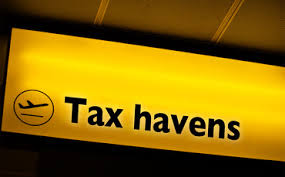Today, the EU Finance Ministers approved two EU lists of jurisdictions that are non-cooperative in taxation matters. The first list (blacklist) names 17 countries which have not responded to information requests from the Council or which have not committed themselves to make their tax policy compliant with EU criteria. The second list (grey list) contains another 47 countries considered harmful, but which committed to improve their tax legislation which will be subject to a monitoring in 2018. The two lists published today are the outcome of an intransparent screening process followed by non-public political discussions of the Council’s Code of Conduct Group on Business Taxation. No agreement has been reached on the list of common and automatic sanctions against blacklisted jurisdictions.
MEP Sven Giegold, financial and economic policy spokesperson of the Greens/EFA group commented:
“It undermines the EU’s credibility that Member States were only able to agree on a whitewashed blacklist of tax havens. Not one of the most important tax havens has been put on the list. The list is politically biased as relevant financial centers like the United States of America are missing. It is a bad joke that due to the hurricanes, eight Caribbean islands have been given additional time to answer the information requests from the Council.
While it is regrettable that Member States demonstrated neither courage nor responsibility when drawing up a screwed list of tax havens, the EU’s blacklisting exercise kicked off tax policy reviews in more than a forty third-country jurisdictions. This demonstrates the potential of European tax co-operation. Despite all its weaknesses, the blacklist is therefore a starting point.
From the very beginning EU Member States were entirely excluded from the screening process although the Netherlands, Ireland, Malta, Luxembourg, the UK and Cyprus do not comply with the EU’s own criteria. In the shadow of the opaque Code of Conduct Group, Member States successfully lobbied to get their own dependencies and overseas territories off the hook. If countries with a tax rate of zero do not appear on the blacklist, it is not worth the paper it is written on. Even worse, as long as the Council cannot agree on common and automatic sanctions against listed tax havens, the blacklist will be toothless.
The EU has to clean up its own house. Likewise, the whole blacklisting process needs to become fully transparent and the reform of the Code of Conduct Group shall not be delayed any longer.”
EU lists of non-cooperative jurisdictions in taxation matters
http://www.consilium.europa.eu/media/31945/st15429en17.pdf
Blacklist (17 jurisdictions):
American Samoa, Bahrain, Barbados, Grenada, Guam, South Korea, Macau, Marshall Islands, Mongolia, Namibia, Palau, Panama, Saint Lucia, Samoa, Trinidad and Tobago, Tunisia and United Arab Emirates
Grey List (47 jurisdictions)
Background
Work on the blacklist of tax havens started in July 2016 within the Council’s Code of Conduct Group on Business Taxation.
In November 2016, the Council agreed on the process to be followed, setting the end of 2017 as a deadline for finalising the list. It laid down criteria for screening third country jurisdictions, namely tax transparency, fair taxation and implementation of anti-BEPS (tax base erosion and profit shifting) measures agreed by the OECD. (Link to screening criteria)
Since then, the Code of Conduct Group has overseen a ‘screening’ that included a technical dialogue with 92 third country jurisdictions on their compliance with the EU’s criteria. After non-public discussions among EU Member States, the outcome of this screening process are the two lists published today. So far it seems that the documents of the screening process and the minutes of the meetings of Member States in the process shall not be published. The EU Member States did not apply the criteria on themselves, not even in a screening exercise.

